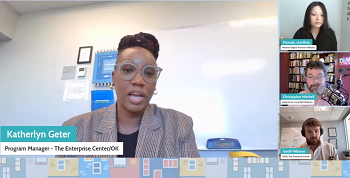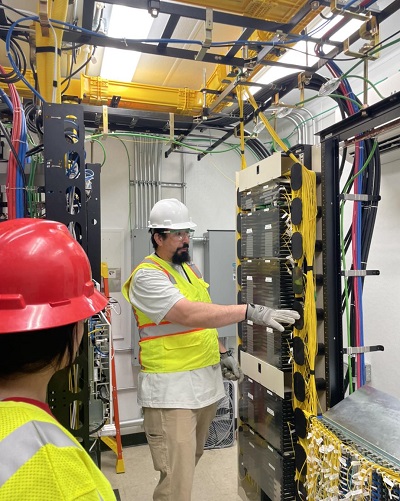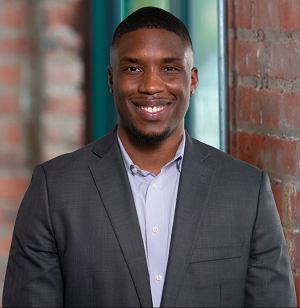
Fast, affordable Internet access for all.

With the holiday season upon us, the Institute for Local Self Reliance (ILSR) Community Broadband Networks Initiative and the National Digital Inclusion Alliance (NDIA) are gearing up for the final Building for Digital Equity (#B4DE) event of the year and encouraging digital equity practitioners to save the date.
The popular (and free) virtual gathering will be held December 12, 2023 from 3 to 4:15 pm ET and will feature a holiday-inspired theme: Digital Equity Unwrapped: End of Year Reflections/The New Year Ahead.
You can register for the event now here.
Coming on the heels of our last B4DE event in October, which is still reverberating through digital inclusion circles across the nation, we are excited to follow up with a jolly and informative agenda that will cover:
The keynote speaker for the event will be Patrick Messac, Director of #OaklandUndivided, an equity-based, collective impact initiative launched in Oakland, California.

This week on the podcast, Christopher is joined once again by Sean Gonsalves, Associate Director of Communications for the Community Broadband Networks initiative.
Christopher and Sean start by discussing how a new wireless community broadband network in Syracuse, New York called Surge Link is helping the underserved households in their area. Syracuse is a prime example of how cities and towns are taking matters into their own hands by looking for ways to proactively provide affordable broadband access to their citizens right now instead of waiting for potential federal funding and local planning to align perfectly.
Sean and Christopher also unpack other recent news, including the FCC's plan to adjust the definition of broadband to 100 Megabits per second (Mbps) download and 20 Mbps upload speeds, the NTIA's Letter of Credit modifications, and the future of the Affordable Connectivity Program (ACP) with the White House asking Congress for an additional $6 billion in funding to continue the program through the end of 2024.
With ACP's future looming, Christopher and Sean finish by discussing the need and importance for a long-term solution to address the digital divide, including the financial sustainability of networks in rural areas.
This show is 33 minutes long and can be played on this page or via Apple Podcasts or the tool of your choice using this feed.
Transcript below.
We want your feedback and suggestions for the show-please e-mail us or leave a comment below.
Listen to other episodes or view all episodes in our index. See other podcasts from the Institute for Local Self-Reliance.
Thanks to Arne Huseby for the music. The song is Warm Duck Shuffle and is licensed under a Creative Commons Attribution (3.0) license.
Syracuse officials have launched a new wireless community broadband network they hope will help bring affordable broadband access to the city of 145,000.
Dubbed Surge Link, the effort is backed by more than $3.5 million in federal funding and aims to deliver free broadband access to the city’s lowest income neighborhoods.
Motivated by peak pandemic connectivity headaches, Syracuse put out a request for proposal (RFP) late last year. The city then hired US Ignite as an advisor, and selected Geneva-based Community Broadband Networks (no relation to our program here at ILSR) to build a fixed wireless network capable of delivering discounted access starting with 2,500 underserved Syracuse households.
City officials tell ILSR the network is using Fixed Wireless Access technology, specifically Citizens Broadband Radio Service (CBRS), which is an emerging technology a growing number of municipalities and other nonprofit community groups have been experimenting with as a way to bring broadband to unserved and underserved residents in dense settings. And while CBRS has promise, as US Ignite notes, “because the technology is relatively new, the hardware and software associated with CBRS networks is also new. Vendors may still be working out the kinks in their solutions, particularly if those solutions are being used in novel ways, or need to interface with other older systems.”
It should also be noted that another New York community (Westchester County) embraced CBRS, only to find that it could not deliver the capacity they wanted to many people who needed the service.
With the Affordable Connectivity Program (ACP) poised to run out of funding in early Q2 next year, and no funding source lined up to keep the program alive, a recent U.S. News & World Report survey underscores the significance of the program in the face of rising prices from the nation’s major Internet Service Providers (ISPs).
The ACP offers a monthly benefit of $30 dollars for qualifying households and $75 for qualifying households on Tribal lands (as well as in some remote areas). Over 20 million Americans to date have enrolled in the program to help pay their Internet service bills, but with the $14.2 billion ACP program on track to run dry as soon as May of next year – even amid a historic national effort to establish “Internet For All” – the affordability crisis has become more worrisome for a growing number of Americans.
U.S. News & World Report’s survey found that Internet prices are going up and that families are compromising other expenses to pay for connectivity, affirming the urgency among digital equity advocates to identify a source of continued funding for ACP, as well as push for more structural solutions that address the root causes of why Americans pay among the highest prices for broadband service in the developed world.
Vermont’s nascent Communication Union Districts (CUD) are pioneering creative efforts to deploy affordable broadband to the rural parts of the Green Mountain State. That includes the Lamoille FiberNet CUD, which has greenlit a major new plan to expand affordable access to fiber in the most neglected parts of rural Vermont.
At an Aug. 14th meeting, the Vermont Community Broadband Board (VCBB) approved Lamoille FiberNet’s $1.3 million pre-construction grant, followed by a mid-September approval of the CUD’s $13.6 million construction grant.
“This grant means that, by the end of 2024, we can bring high-speed internet to almost all the homes and businesses in our CUD that are unserved or underserved,” Lamoille FiberNet Communications CUD Chair Jeff Tilton said in a statement.
With the Lamoille CUD covering 10 towns in the north central part of the state (Belvidere, Cambridge, Eden, Elmore, Hyde Park, Johnson, Morristown, Stowe, Waterville and Wolcott), Lamoille plans to have Fidium Fiber and Consolidated Communications deploy and manage 630 miles of new fiber connecting more than 4,800 unserved and underserved Lamoille County homes and businesses. The network will be deployed in two phases.
If you missed today’s Building for Digital Equity (#B4DE) livestream event – "Building Connected Communities: Sustaining the Momentum" – no sweat.
You can still see the entire program below. The latest installment of #B4DE was packed with practical information and inspiration on everything from the latest on the Affordable Connectivity Program (ACP), outreach to veterans, telehealth and broadband adoption – mixed with on-the-ground intel from local communities pushing the digital equity movement forward.

Co-hosted by ILSR’s Community Broadband Networks Initiative and the National Digital Inclusion Alliance (NDIA), the event was capped off by keynote speaker and emerging digital equity leader Joshua Edmonds, CEO of Digital C in Cleveland, who painted a powerful and expansive vision of digital equity work based on insights that have emerged from working in the trenches.
The entire #B4DE live stream, sponsored once again by UTOPIA Fiber, can be seen below. And, for other Digital Inclusion Week (DIW) engagements check out NDIA’s page here.
Lots happening for Digital Inclusion Week 2023, which kicks off this Monday. One free online event that will be of particular interest for digital equity advocates across the nation is the next National Digital Inclusion Alliance (NDIA) and Institute for Local Self Reliance (ILSR) Building for Digital Equity (#B4DE) Livestream.
The popular virtual gathering will be held this Tuesday, Oct. 3, from 12 noon to 1:15 pm ET and will focus on the DIW-inspired theme: “Building Connected Communities: Sustaining Momentum.”
Attendees can still register here.
Building on the success of our previous events, we are excited to present another engaging agenda packed with practical insights and information digital inclusion practitioners can use while working in the trenches to bridge America’s yawning digital divide.
The agenda includes:
From Colorado to Texas, municipal broadband providers continue to rack up industry accolades, not just for delivering fiber service–the gold standard of Internet connectivity–but for these networks’ ability to provide ubiquitous access across an entire community at affordable rates.
The National Association of Telecommunications Officers and Advisors (NATOA) recently announced that its Community Broadband Projects of the Year Awards for 2023 will go to the Connexion network in Fort Collins, Colorado and TeamPharr.net in Pharr, Texas.
Awarding Community-Wide Access and Affordability
The Fort Collins award is in recognition for the city having established “a municipal broadband utility created by and for the community to improve the life of all 80,000 residential and commercial properties of Fort Collins through better, more affordable Internet,” NATOA said in announcing the award.

But it wasn’t just because Fort Collins’ network provides city-wide access to fiber. The award also recognizes that “Connexion offers the fastest Internet speeds available at affordable prices (emphasis added) as well as competitive phone and TV services.”

Naming groups of things is one of the few pure joys in life. But despite having a shiver of sharks, a thunder of hippopotami, a discovery of witches, and about a million others, as of yet we've got nothing to describe a group of Internet access and infrastructure who have forgotten more about the business of broadband than the average person is likely to ever see, smell, or hear. From the economics of building fiber networks to the technical challenges of different radio spectrum bands, they separate the signal from the noise every single day.
So how about a scattering of wonks?
This week on the podcast, we bring over the most recent conversation from our Connect This! Show, where for 80 episodes we've hosted broad discussions about broadband policy and infrastructure deployments and live by the mantra that the devil's in the details. Christopher is joined by Travis Carter (USI Fiber), Kim McKinley (UTOPIA Fiber), and Heather Gold (Mears Group) to tackle a host of issues, including why we don't see more cities doing deals with entities like Google Fiber, what we can expect now that Anna Gomez has been confirmed to the FCC, what it means for BEAD grantees if the Affordable Connectivity Program goes away, and more.
Along the way, they hit on what we're seeing in Vermont's Communications Union Districts, a partnership in West Des Moines, Iowa, and whether there's renewed hope for the ACP as it nears the six-month mark from running dry.
This show is 79 minutes long and can be played on this page or via Apple Podcasts or the tool of your choice using this feed.
Transcript below.
We want your feedback and suggestions for the show-please e-mail us or leave a comment below.
Listen to other episodes here or view all episodes in our index. See other podcasts from the Institute for Local Self-Reliance here.
Thanks to Arne Huseby for the music. The song is Warm Duck Shuffle and is licensed under a Creative Commons Attribution (3.0) license.
With Digital Inclusion Week (DIW) less than a month away, ILSR and the National Digital Inclusion Alliance (NDIA) are gearing up for the next Building for Digital Equity (#B4DE) event and encouraging digital equity practitioners to save the date.
The popular virtual gathering will be held Oct. 3 from 12 noon to 1:15 pm ET and will focus on the DIW-inspired theme: “Building Connected Communities: Sustaining Momentum.” The event is free and open for registration here.
Building on the success of our previous events, we are excited to present a fun and informative agenda that will cover:

The keynote speaker for the event will be Joshua Edmonds, CEO of Digital C, the Cleveland-based nonprofit technology social enterprise. Edmonds will focus on the link between building appropriately-motivated physical networks and how infrastructure and digital equity work go hand-in-hand.